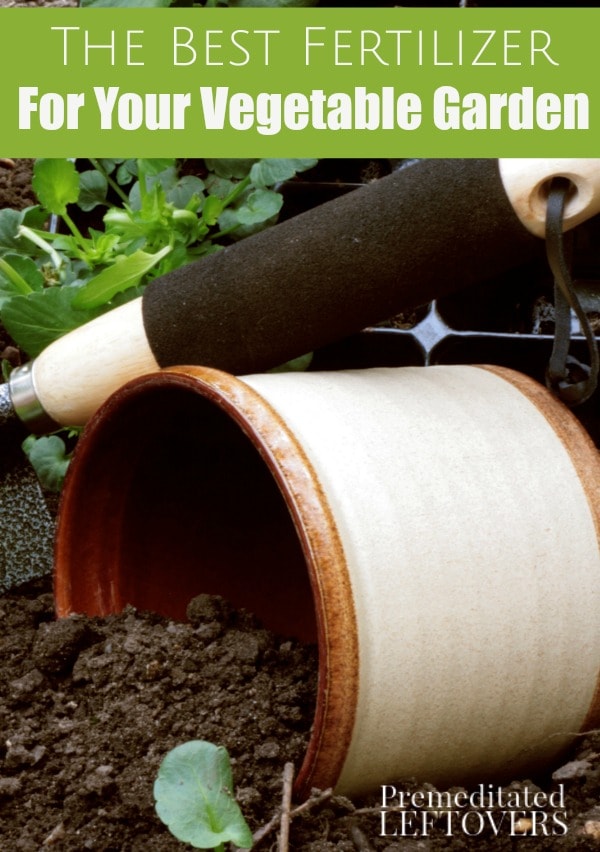Vegetable garden season is here, and one of the most important things to consider is the best fertilizer for your plants to grow.
Fertilizer is a key part of harvesting a great crop of fresh vegetables from your backyard vegetable garden. There are tons of choices in the local garden centers and nurseries, as well as fertilizers you can create on your own. Here are a few ways to identify The Best Fertilizer for Your Vegetable Garden.
The Best Fertilizer For Your Vegetable Garden
When you start planting your vegetable garden, you will want to prepare your soil to feed your plants. Knowing how to pick the best fertilizer is all about understanding your individual soil needs. Some areas have great rich soil that will be hearty and healthy already so limited amounts of fertilizer are needed. Other areas have dry soil, clay, or even rocky soil that will need more nutrients to help your plants thrive. To figure out what your soil needs, you can invest in a simple pH Soil Test Kit. This test kit will tell you what your current soil looks like and if it is healthy for the plants you are considering planting. From that point, you can determine if you need to add more or less of specific things to build a healthier soil for your plants.
Natural Compost: Making your own compost is almost always going to be the best fertilizer for your vegetable garden. Because you can work on adding specific items to your compost, it makes it much more uniquely useful for your soil and garden. Creating your own compost includes adding things like vegetable and fruit peels, leaf clippings, grass clippings, pruned plant clippings, shredded newspaper, coffee and tea grounds, crushed eggshells, and even fish enzymes or fish carcass to your soil to decompose and then create your own natural compost. Being able to add more or less of specific items into your compost can help you add more of a specific nutrient your soil needs.
You can take the time to learn what each of the things you use in your own natural compost will give to your soil so you can use moe or less to create the ideal compost blend for your soil and plants. This is one of the main reasons many prefer this method of fertilizer over purchased products. Direct control over components makes it easy to manage your soil and plants, but it does also take more testing, education, and ultimately more time. It can be very cost effective, though, so is still a highly popular choice for vegetable garden producers.
Organic Fertilizers: If you are creating an organic vegetable garden, these are your safest bet. However, since organic fertilizers don’t have chemicals to speed things up, you won’t see results as fast. This means you may want to fertilize your soil earlier in the season prior to planting, at planting, and again throughout the season. For some, this can be a very costly effort. It can take more organic fertilizer to produce the same results a traditional fertilizer would give you in your vegetable garden.
There are various 5-5-5 blends that include a routine mix of the top nutrients soil needs. These are great overall choices and work well for almost any soil and garden type. You may also want to consider using straight manure from a reputable location, or fish enzymes for a more robust fertilizer in your vegetable garden. The key to using organic fertilizer in your vegetable garden is in planning. Plan ahead to build the right organic compost or purchase well in advance of planting season so your soil will be ready for all of your seeds and seedlings to thrive.
Chemical Fertilizers: These are, by far, the most popular fertilizers used in home vegetable gardens. They require little work, have fast results, and are readily available on any budget. If you want larger produce or more produce, they work great and fast. However, they don’t last long term, so you will constantly be feeding your plants and soil more and more of these. This can be pretty costly for a long term garden project.
Where an organic fertilizer will enrich the soil for many months and even years, a chemical fertilizer works fast and only on that plant location at the time. This results in great plants now, but a lot of expense long term. You may also find that overuse of chemical fertilizers can be damaging to plants. The chemicals in the fertilizer are meant to act fast and be absorbed by plants immediately. This means adding too much too fast can actually kill the plant, so if using this method make sure you follow directions closely.
Ask a local master gardener. When in doubt, get in touch with a local nursery or master gardener for recommendations. They have years of experience in dealing with soil and plants so they can tell you easily what you should add to your soil as the best fertilizer to really build a great hearty harvest of produce. While it may not be ideal to ask for help, it can be the only way to have a successful vegetable garden if you are totally new to gardening.
Whether you are creating your own organic or natural compost, buying a ready made produce, or using more popular commercial chemical fertilizers you can easily have a successful vegetable garden this year. Build up your soil and plats to produce a hearty harvest of your favorite vegetables for use in summer meals as well as storage for use year round. For budget friendly meals, growing your own produce in a vegetable garden is one of the best ways to feed your family.
More Vegetable Gardening Tips:
Tips for Fertilizing Your Vegetable Garden
10 Tips for Growing Vegetables
8 Vegetables You Need to Grow in Your Garden


Leave a Reply